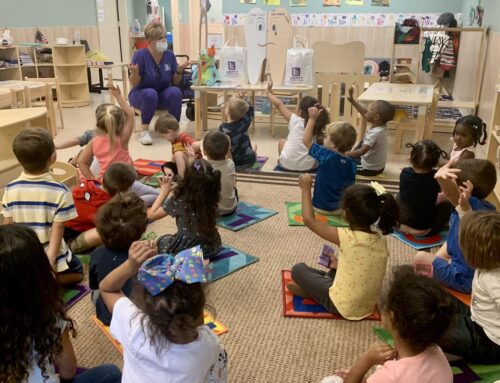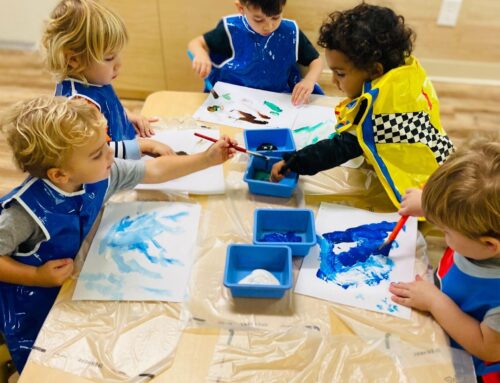In today’s rapidly changing educational landscape, Voluntary Prekindergarten (VPK) programs are at the forefront of preparing young learners for the challenges of kindergarten and beyond. With a focus on the development of physical, social/emotional, and cognitive skills, VPK educators recognize the intricate connections between these domains and the critical need to foster holistic development. One essential aspect of modern VPK programs is the integration of technology into the classroom, providing children with a well-rounded foundation for success.
Nurturing Early Tech Literacy
VPK assessments now require children to use computers, highlighting the importance of early tech literacy. Hatch Smartboards have emerged as invaluable tools for introducing technology in a playful and age-appropriate manner. These interactive whiteboards engage children, building a strong foundation for future tech skills.
Personalized Learning Journeys
Technology enables personalized learning experiences, addressing the diverse needs of each child. Educational software adapts to individual learning styles and paces, ensuring that children receive tailored instruction, setting them up for success.
Early Exposure to Educational Content
VPK children benefit from access to a wealth of educational content. Engaging apps, multimedia presentations, and interactive games make learning enjoyable while teaching crucial skills like literacy, numeracy, and problem-solving.
Fostering Collaboration and Communication
Technology in VPK classrooms promotes collaboration and communication among young learners. Interactive activities encourage teamwork, social interaction, and vital interpersonal skills.
Preparing for Future Educational Demands
Early tech exposure helps children transition smoothly into technology-driven learning environments in later grades, aligning with VPK’s goal of preparing children for the future.
Bridging the Digital Divide
By integrating technology, VPK programs ensure equitable access to digital learning resources for all children, regardless of background.
Enhancing Parental Involvement
Technology fosters strong parent-teacher partnerships, keeping parents informed about their child’s progress and fostering active engagement in their education.
Fostering Problem-Solving and Critical Thinking
Interactive technology-based activities challenge children to think critically, solve problems, and explore their creativity, building essential cognitive skills.
Preparing for the Digital Workforce
Early tech exposure equips VPK children with valuable digital skills, potentially enhancing future career opportunities.
Making Learning Fun
Technology ensures that learning is engaging and enjoyable, motivating children to stay curious and enthusiastic.
Technology as a Bridge to Future Success
Incorporating technology into VPK programs, such as Hatch Smartboards, empowers children to become confident, digitally literate learners. This balanced approach enhances traditional teaching methods, preparing children for the digital age and setting them on a path to academic success.
Understanding the Learning Domains
VPK educators recognize the complex interplay between physical, social/emotional, and cognitive development. Attention to all domains is essential, as each influences the other. For example, early experiences shape impulse management and social skills, which, in turn, impact a child’s ability to learn effectively.
The Power of Early Literacy and Math Skills
Research underscores the importance of early literacy and math skills. The National Early Literacy Panel (NELP) found a strong connection between these skills developed from birth to age 5 and later conventional literacy skills. Early exposure to alphabet knowledge, phonological awareness, and other precursor literacy skills significantly predicts later literacy development.
Similarly, mathematics education is crucial for young children. Early exposure to numbers, operations, geometry, and spatial thinking lays a solid foundation for future mathematical understanding.
Intentional Teaching Approaches
High-quality VPK programs emphasize intentional teaching approaches. Features such as one-on-one teaching, the presence of planful lessons, and opportunities for meaningful firsthand experiences enhance learning. Teachers play a pivotal role in guiding children’s progress and ensuring their readiness for kindergarten.
The Role of Technology in VPK Programs
Technology, like the TeachSmart Solution, is a powerful tool that complements VPK programs. It enhances the teacher’s role by providing interactive learning environments, personalized instruction, and playful activities that align with national pre-k standards. TeachSmart offers a balanced approach between discovery and intentionality, making learning fun and effective for young children.
Resources for Parents
For parents interested in learning more about the Hatch Smartboards and how they can support their child’s education, we invite you to explore the Hatch Smartboard website. Here, you’ll find valuable information, tutorials, and insights to extend the learning experience from the classroom to your home. Visit Hatch Smartboard to empower your child’s educational journey.
Conclusion: Preparing VPK Children for Success
The integration of technology into VPK programs is not just a trend but a strategic investment in the future of our young learners. It empowers them with digital literacy skills while fostering creativity, collaboration, and critical thinking. By striking a balance between traditional and digital methods, VPK programs ensure children are well-prepared for success in school and beyond.





Leave A Comment